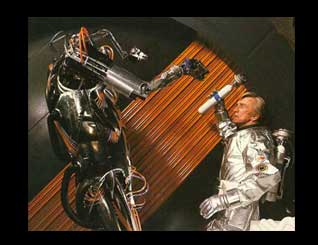
Classic CC2K: History judges Saturn-3
Written by: Lance Carmichael, CC2K Staff Writer
• Speaking of Apocalypse Now … is everyone aware that Keitel was originally cast in the Martin Sheen role? And that, for reasons that still have never to my knowledge been made clear, Coppola decided to fire Keitel after a week of filming, throw away all the expensive footage he’d already shot, fly Sheen out to the Philippines, and replace Keitel? This was one year before Saturn 3 was made. Can there be any doubt why Keitel disappeared into a funk for the entire 1980s? Did he look at Kirk Douglas skipping rope on camera and think to himself “De Niro’s filming Raging Bull right now. A year ago I was cast as the lead in Apocalypse Now … where’s the coke?”
(Apocalypse Now wasn’t the only quality movie Keitel’s gotten 86’ed from. If memory serves, Stanley Kubrick replaced him on Eyes Wide Shut mid-shooting with Sydney Pollack. This has to be another of the great untold movie stories. Did Kubrick’s obsessive 100 takes of every scene drive Keitel over the edge, leading to some sort of confrontation? Would Harvey just not do it for control-freak Kubrick?
My favorite theory was the one that was floating around when the news leaked from the set that Keitel had been fired. As you may remember, security was Pentagon-tight on that movie, with almost nothing leaking out to the hungry Kubrick fanatics out there. All we heard about Keitel was that he MAY have been kicked off for coming on Nicole Kidman’s breasts in a masturbation scene. This story was and continues to be obviously untrue, and yet …
I choose to continue believing this story, despite there being no scene in the movie where the Keitel/Pollack character would have had been in a position to do this. In fact, the only scene that the Keitel/Pollack character interacts with Nicole Kidman is when K/P greets Cruise and Kidman at his gala black tie party in his mansion. Did Keitel whip it out of his tuxedo pants right then and there, in a brazen FU to all social convention and decorum? (If yes, I reconsider my reconsideration of Keitel as a “great” actor.)
Okay, I have now peeked at the real IMDb Harvey Keitel filmography. I’ve cheated and corrected the years listed in my personal memory’s filmography. On the official list, here’s the decent movies I forgot/didn’t know about, along with reasons not to get excited:
• The Last Temptation of Christ, 1988, as Judas. I personally think this movie’s got a pretty bloated critical reputation.
• Thelma and Louise, 1991. A movie whose lasting impact is destined to be as the template for Marge-centered Simpsons episodes.
• Sister Act, 1991, as “Vince LaRocca”: This was Whoopi’s first big hit in a starring role. So, in the space of one year, we have Harvey Keitel to thank for jump-starting the careers of Whoopi Goldberg and Quentin Tarantino. I love Tarantino, but the world will be forced to endure Whoopi as the Oscar host every three or four years until she dies. I think these cancel each other out.
• Monkey Trouble, 1994: Keitel’s fifth undisputed masterpiece.

• Clockers, 1995: Together, he and Spike Lee formed the ultimate My-Name-is-Inexplicably-Linked-With-Quality-Based-on-One-or-Two-Movies duo.
• Copland, 1997: Question: When was the last time you thought about Copland? Answer: The same moment you thanked God for mercy-killing Sylvester Stallone’s career. (Sidenote to God: Stallone began his career in porn … wouldn’t it be nice and symmetrical if he were forced to end it there?)
I’m going to dedicate myself to correcting a commonly held misconception. Folks, movie actors are only as “great” as the director they’re working with. Can we stop pretending it’s otherwise? Does anyone truly think Robert De Niro’s inherent actor-ly “greatness” would have burned through the screen if he’d have happened to have landed as Ed Wood’s stock actor, rather than Top-5-directors-of-the-20th-century Martin Scorsese? I challenge all those who write about film to start applying this corrective to their work. And while we’re at it … can we stop giving all credit for the imagination and creativity of creating a movie to the director (unless the movie is written by Charlie Kaufman)? Are movie critics and entertainment writers aware of this thing called a “screenplay,” which is generally where a description of the ENTIRE MOVIE is written down before a director is even attached to it? I’m even taking myself to task on this: Lance, Paul Shrader, not Martin Scorsese, wrote Taxi Driver. Never forget that.
Which brings me, sadly and inevitably, to the screenwriter of Saturn 3:
Martin Amis.
Yes, lovers of literary fiction, that Martin Amis. Acclaimed novelist, essayist, and son of Kingsley Amis. Essentially one of the most revered British novelists of our time. If you’re a fan of literary bile Amis spits forth in London Fields or The Information, it’s fun to watch what I can only hope was a formative experience in giving breath to his cynicism. Funny there’s no mention of this in his author bios in his tasteful Vintage Press paperbacks.
Okay, that’s all that can be gleaned from Saturn 3.
